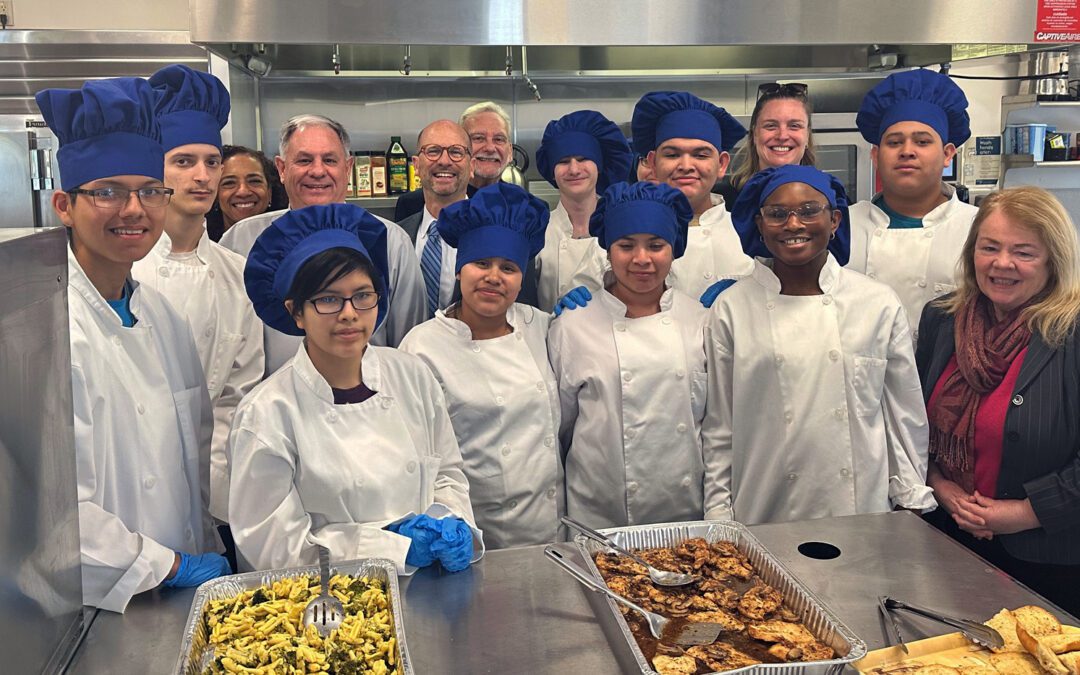March has been recognized as Developmental Disabilities Awareness Month since 1987 when President Ronald Reagan issued a public proclamation urging Americans to provide individuals with developmental disabilities “the encouragement and opportunities they need to lead productive lives and to achieve their full potential.” One of the main goals for educators within New Jersey’s eight county special services school districts is preparing students with disabilities for their next steps in life and career readiness plays a major role in that journey. From classroom education to on-the-job training, the common goal across all transition programming, throughout all members of the New Jersey Joint Council of County Special Services School Districts, is to help each student achieve the highest level of independence.
Serving up Job Skills with Hands-On Learning
From school stores to student-run cafes and job shadowing out in the community, Career and Technical Education (CTE) is an essential component that provides incredible opportunities for students in special services school districts. CTE gives students an opportunity to learn skills and gain experiences outside of a typical classroom and helps students develop not just vocational skills, but also social skills while helping them set goals and potentially carve out a path for gainful employment.
“We are unrelenting advocates for our students,” said Dr. Howard Lerner, Superintendent of Bergen County Special Services School District and Chairman of the NJ Joint Council of County Special Services School Districts. “Getting them involved in hands-on learning and preparing them for their next steps in life is one of our biggest missions here and in all of the special services districts. There’s no greater joy than seeing our students succeed.”
That joy and pride from Lerner was felt earlier in March when students from the district’s Career Crossroads program collaborated to put together a luncheon for some distinguished guests. The culinary students have been hard at work running the school’s bistro and that hard work was showcased when Bergen County Executive James Tedesco, County Commissioner Mary Amoroso, along with Maria Marte, as well as the Bergen County Special Services Board of Education President Gary Lentini, and other board members, William Barnaskas, Kelly Epstein, and Ana Marti visited to see the program in action.
“The students did a phenomenal job on the meal, presentation, service and interacting with our guests for the day,” said Lerner. “The students were so excited to demonstrate their skills and we were so proud. That’s what this program is all about.”
Culinary programs are popular within special services districts, offering students an opportunity to learn and practice technical skills like basic cooking, meal presentation, and how to follow and create recipes. These programs also utilize students’ critical thinking, having them plan, purchase, and manage inventory. Students in the Cape May County Special Services School District are responsible for creating daily specials, working the register, and stocking all items at their Back Porch Cafe. Serving breakfast and lunch Monday-Friday, the students learn interpersonal skills by interacting with customers and get to practice math by working the register. Stocking all of the items daily also helps students refine motor skills and proper storing procedures, especially when it comes to food handling safety – something that’s also learned in the school’s food pantry.
“Building confidence and giving students the soft skills needed to succeed is a major focus for us, and all special services schools,” said Jamie Moscony, Superintendent of Cape May County Special Services School District. “We know how important it is for our students to practice skills in a real-world scenario.”
At Cape May County Special Services School District, students in the Community Based Instruction program also remain on campus for work-based learning. Instead of learning through simulations, they have opportunities to take on a job that supports their school community, whether that’s through the café, laundry services, or assisting the facilities staff.
In Mercer County Special Services School District, Mercer High School students have the opportunity to work with the district’s littlest learners. The district has successfully placed several graduates in classroom assistant positions in the Joseph Capello School, which serves children ages 3-7. Currently working with preschool and physical education classes, MHS student workers facilitate group activities with the students, while promoting language and appropriate social skills.
“We hope to continue to strengthen this career path for several of our current student workers”, said Kristen Taylor, Assistant Superintendent of Mercer County Special Services School District. “Our work-based learning programs provide students the opportunity to develop independent skills in a structured, supported environment that they can then transfer to employment outside of the district.”
Another way Mercer County does that is through the Friends and Helping Hands program. Students at MHS package and distribute meals for 300 families in nearby communities on a weekly basis. Partnering with a Trenton-based food bank, the school receives the raw food materials on a bi-monthly basis. Students use critical thinking to plan and coordinate meal boxes and work together to consistently put together balanced meals for those they are serving. Additionally, the students learn about civic pride and the power of giving back.
Burlington County Special Services School District CTE students had an opportunity to give back while getting hands-on skills training. Students in the woodshop class recently built and sold bat houses as part of a fundraiser for the Cedar Run Wildlife Refuge. Each project done in the wood shop allows students to do the part of the project that helps them achieve the most success; this was also true for the bat houses. Some students cut the wooden components with the saw, others sanded and smoothed the rough edges of the wood and nailed parts together, while some students painted. Teaching staff in the wood shop work to ensure that each student uses their strengths to create an enjoyable experience of building things in the shop.
There is no shortage of work-based learning at BCSSSD—the Transition program offers opportunities for students to work in a retail setting as one of their in-house experiences. The Pioneer Posh online store is operated just like a traditional Poshmark closet; students use their organizational, writing, and technology skills to carry out all tasks associated with online sales. From intake of new items to writing descriptions and researching prices online to tracking and shipping sales. Students learn and use a variety of skills that can be carried with them into the future.
“We are grateful to the our staff at BCSSSD, who constantly generate ideas for new, innovative projects to help our students learn valuable skills that can be adapted to many different areas of their lives,” Dr. Christopher Nagy, Superintendent of Schools.
Throughout the state, work-based learning and CTE programs run by county special services school districts help form strong, diverse communities by empowering students with developmental disabilities. The administration and staff in our programs work together to ensure that students are prepared for the future and offered many opportunities to be successful.

